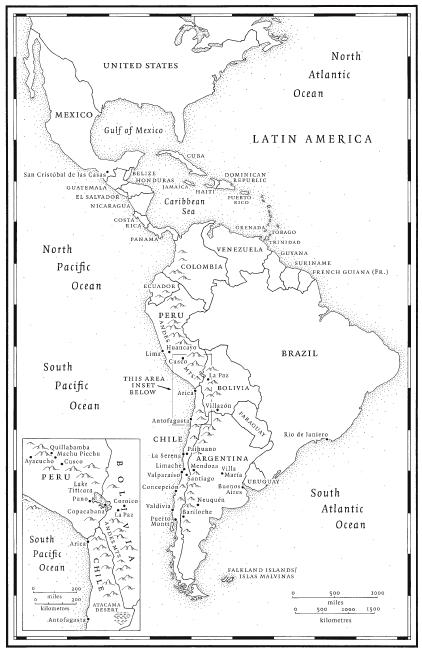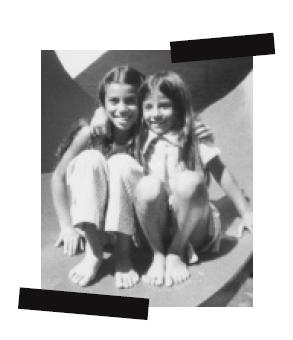Something Fierce


SOMETHING FIERCE
SOMETHING
MEMOIRS OF A
REVOLUTIONARY DAUGHTER
FIERCE
CARMEN AGUIRRE
 Douglas & McIntyre
Douglas & McIntyre
D&M PUBLISHERS INC.
Vancouver/Toronto
Copyright © 2011 by Carmen Aguirre
Published in the United Kingdom
by Granta Publications/Portobello Books Ltd.
11 Â Â 12 Â Â 13 Â Â 14 Â Â 15 Â Â 5 Â 4 Â 3 Â 2 Â 1
All rights reserved. No part of this book may be reproduced, stored in a retrieval system or transmitted, in any form or by any means, without the prior written consent of the publisher or a licence from The Canadian Copyright Licensing Agency (Access Copyright). For a copyright licence, visit
www.accesscopyright.ca
or call toll free to 1-800-893-5777.
Douglas & McIntyre
An imprint of D&M Publishers Inc.
2323 Quebec Street, Suite 201
Vancouver bc Canada V5T 4S7
www.douglas-mcintyre.com
Cataloguing data available from Library and Archives Canada
ISBN 978-1-55365-462-9 (cloth)
ISBN 978-1-55365-791-0 (ebook)
Editing by Barbara Pulling
Jacket design by Peter Cocking
Jacket and interior photographs courtesy of Carmen Aguirre
We gratefully acknowledge the financial support of the Canada Council for the Arts, the British Columbia Arts Council, the Province of British Columbia through the Book Publishing Tax Credit and the Government of Canada through the Canada Book Fund for our publishing activities.
For my son, Santiago, love of my life, the greatest teacher of all
In memory of Bob Everton, 1949â2004
VALOR
Te dije:
“Se necesita mucho valor
para tanta muerte inútil.”
Pensaste que me referÃa a América Latina.
No, hablaba
de morir en la cama,
en la gran ciudad,
a los ochenta o a los noventa años.
CRISTINA PERI ROSSI,
Estado de Exilio
COURAGE
I said to you:
“One needs a lot of courage
for so much useless death.”
You thought I was referring to Latin America.
No, I was talking
about dying in bed,
in a great city,
at eighty or ninety years old.
CRISTINA PERI ROSSI,
State of Exile

CONTENTS

A
S MY MOTHER bit into her Big Mac, her glasses caught the reflection of a purple neon light somewhere behind me. Barry White's “Love's Theme,” my favourite song, blasted from the loudspeaker. Mami looked hilarious in her new aqua eyeshadow. Her plucked eyebrows gave her a surprised expression. Then there was her frosted pink lipstick, which was smeared across her chin now, and the unfamiliar scent of Charlie. I'd helped her choose that perfume. The picture on the box showed one of Charlie's Angels doing the splits in mid-air, wearing a white pantsuit and platform shoes. In dressing for our trip that morning, my mother had followed her lead, though not the splits part, because she was four foot ten and round. Now here we were in a food court at Los Angeles International Airport, which my mother referred to as “L-A-X.” She and I and my sister, Ale, had walked for ages through the terminal, looking for our gate, and the whole time she'd rubbed the palms of her hands into the small of her back, muttering, “Firing squad to the woman hater who invented heels.”
It was June 1979, and the day before, in Vancouver, Mami had been a hippie. She'd been a hippie for as long as I'd been her daughter, in fact, which was eleven years now. That's why Ale and I had giggled when we saw her this morning, and why we'd been shocked a few weeks earlier when Mami announced we were going to a mall. She'd tried on most of the inventory at Suzie Creamcheese before settling on the white polyester pantsuit and some matching platforms at Aggies. She was usually dressed in frayed jeans with patches on the ass and a pair of old clogs. But this was a special occasion, requiring a new wardrobe to go with it, my mother had explained. We'd found her in the kitchen that morning blowing on her toenails, which were wet with red polish, humming Victor Jara's famous song “The Right To Live in Peace.” Our passports were laid out like a fan on the table. The three of us hadn't looked back as we left our basement suite. Canada had taken us in after the coup in Chile five years earlier, but my mother had made it clear from day one that the refugee thing in the imperialist North was not for us. So our suitcases had been packed again, and our posters of Ho Chi Minh, Salvador Allende and Tupac Amaru taken down and given away. Rulo drove us to the airport in my mother's orange VW Bug, and Mami had several attacks of the giggles along the way, because he'd only just learned to drive. “Clutch, Rulo, clutch, you idiot!” she yelled. I'd never seen Rulo so excited, and I knew it was because he'd get to keep the car from that day on.
This part of the imperialist North, LAX, was very different from anything I'd seen so far. In Vancouver, we and the few dozen other Chilean families had been the only Latinos. That city, where you could buy tropical fruit in the dead of winter, was full of white people who kept their bodies and faces perfectly still when they talked. At LAX we were surrounded by the sound of Mexican Spanish, and there were black people everywhere. I could see palm trees and turquoise sky just beyond the glass walls of the airport. The lady who'd sold me a cheeseburger with no patty (I'd been a strict vegetarian since I was eight) had touched my cheek and spoken to me in Spanish. She'd recognized herself in me, and somehow I understood that. For the first time in five years, I thought maybe I belonged somewhere. But it couldn't possibly be here, because the North was the forbidden place of belonging.
A Colombian family at the table next to us argued and laughed and broke into spontaneous cumbia. When I went up to the counter for a second banana milkshake, one of the Colombian ladies asked me if I was going to Bogotá, like her. I shook my head. I couldn't explain where I was going or where I was coming from. There were too many winding roads leading each way. But she had recognized herself in me, too, and I swallowed down some tears hard and fast.
Back at our table, Mami was finishing her hamburger, her eyes far away. I'd never seen her eat a Big Mac before. McDonald's was the ultimate symbol of imperialism, so we had always boycotted it. Ale showed off a new helium balloon featuring a portrait of Ronald McDonald. It had been given to her by Ronald himself, who'd passed through moments ago. Two years before, when she was eight, Ale had run away from home. My parents and the other adults had never learned about my sister's bold attempt at a new life; they'd been too busy printing Victoria Final (Final Victory), the monthly newsletter they put out from our dining room table. It was my cousins Gonzalo and Macarena and I who followed Ale down the street and brought her back. She'd been clutching her Easy-Bake Oven, given to us by a church group that helped refugees. I sucked the airport milkshake past the knot in my throat.
Our stepfather, Bob, had left Vancouver a few months earlier, and now we were flying to join him in Costa Rica, revolutionary Central America. Goodbye to my elementary school city, to the land of late-night janitor work, hand-me-down Barbie dolls and Salvation Army clothes. Goodbye to my father, who was staying behind.
My mother and father had gotten a divorce, joining so many other Chileans whose marriages had not withstood exile. One afternoon when Ale and I got home from school, my parents were waiting for us at opposite ends of the living room. Mami's glasses were all steamed up, and Papi was staring out the window, his chin quivering. My mother explained that she was moving out, that she couldn't be with my father anymore but she'd always be our best friend. She was going to live with some other women in a communal apartment, and we could visit her there and go to the park. After a long hug, she drove away in the orange VW, its trunk held down by a coat hanger, and just like that, our family was broken forever. The next time we saw Mami, she was on stage, singing with Rulo, my uncle Boris and the other Chileans with whom she'd formed the folk group Revolución. When we met up with her after the show, a terrible shyness hit me. I'd never had to meet my mother anywhere before, the way you meet a stranger.